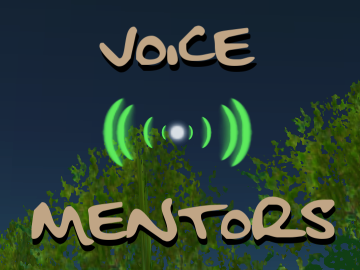Voice Mentors: Getting Started with Voice/es
< Voice Mentors: Getting Started with Voice
Jump to navigation
Jump to search
Revision as of 14:40, 16 June 2007 by Yuu Nakamichi (talk | contribs) (New page: frame|right|Voice Mentors Logo {|cellspacing="5px" |valign="top"| __TOC__ |valign="top" width="50%"| {{Voice Mentors/Translation}} |} * '''Note: Please ...)
- Note: Please help by translating the remainder of this article — thank you!
Instructiones para el uso de voz en Second Life
En Second Life está disponible la voz ahora en un mundo de prueba ("voice beta grid") y en seguida habrá voz en el mundo central ("main grid"). Esta nota fue creada para ayudarlo a usar esta función nueva.
Antes de usar la voz en Second Life tendrá que cumplir con varias cosas:
- Conectar y probar un micrófono y auriculares a su computadora. Es importante usar auriculares con voz porque usar baffles les provocará ecos a otros participantes. Podría probar la voz con "Voice recorder" en Windows y "System Preferences->Sound->Output y Input" en Mac OSX antes de probarla en Second Life.
- Bajar e instalar el programa (cliente con voz) de Second Life.
- Apagar otros programas que usen el microfono y los auriculres. El cliente de Second Life tiene que controlarlos.
- Prender el cliente y entrar en Second Life. Con el cliente de "voice beta" tendrá que poner el nombre de su "avatar" y su contraseña. Use los mismos que con el "main grid". Después de entrar estará en cualquier parte del mundo de prueba ("beta voice grid"). Este mundo no es el mismo "grid" como que el "main grid", es más pequeño.
- Verificar la configuración de su computadora. Haga clic en Editar (Edit en ingles) y luego en Preferencias (Preferences). En la ventana que aparezca, haga clic en "Voice Chat". Ponga una marca en la cajita que está a la izquierda de Enable Voice Chat y una marca a la izquierda de Use Push-to-talk mode. Remueva la marca a la izquierda de Push to talk acts as a toggle. Sin cambiar otras configuraciones podrá oprimir el boton central del raton para hablar. Para cambiar esta función haga clic en Set key y oprima la tecla que le gustaría usar para hablar. Tendrá que escoger una tecla desde la lista.
I've logged in! Now what?
- Control your headset / mic
- Además hay algunos metodos para hablar.
- En la parte inferior de la pantalla hay un botón azul con la palabra Talk. Puede hacer clic y mantener oprimido el botón izquierdo del ratón para hablar.
- If you have enabled Push-to-Talk in the Voice Chat preferences, use the appropriate key or mouse button to trigger your microphone. When you press the key/button, the Talk button will 'glow' yellow when the mic is open and the little green indicator will light up when you speak.
- If you have enabled Push-to-Talk acts as a toggle in the Voice Chat preferences, you can use the key or button as a mic toggle. The Talk button will glow yellow until you press the key/button again.
- The left portion of the Talk button has a small lock icon; click on it to use your mic hands-free (i.e. to toggle the mic's open state). The button will 'glow' yellow when your mic is switched on. Click the lock again to turn your mic off.
- Note: When you first log in or when you select Push-to-Talk acts as a toggle, your microphone may be switched on permanently. This can have two undesirable effects: if you use a loudspeaker-microphone combination instead of a headset, your open mic will create feedback ("echo") in the voice channel; what's more, any ambient sounds near you (radio, tv, other people, street noise) will be broadcast to everyone near you in Second Life. Check the Talk button at the bottom of your screen; if it 'glows' yellow, your mic is switched on. Press the button to turn it off.
- Spatial Channel
- The "spatial voice channel" enables you to talk to persons near you (within a radius of about 20m). Other avatars using the spatial voice channel with you have a voice indicator (a green dot) over their heads — or where their heads would be :) Ahora debe haber un punto blanco sobre su cabeza. Este punto indica que ya funciona la voz. Oprima la tecla para hablar (la tecla escogido antes) y hable. Deben aparecer ondas verdes alrededor del punto blanco. Estas ondas indican que funciona el micrófono. Ondas rojas indicarían que habla demasiado alto. También debe oir algunos sonidos por los auriculares. Busque a alguien con un punto blanco sobre su cabeza y hable.
- Group Voice Chat
- (to be added)
- One-to-one Voice Chat
- (to be added)
- Es todo!
Troubleshooting
- I can't hear other people and they can't hear me!
- If you can't use voice at all, visit http://www.testmyvoip.com and test your connection. If you fail these tests, you won't be able to use voice in Second Life: this could be due to firewall restrictions or problems with your router's configuration.
See also

